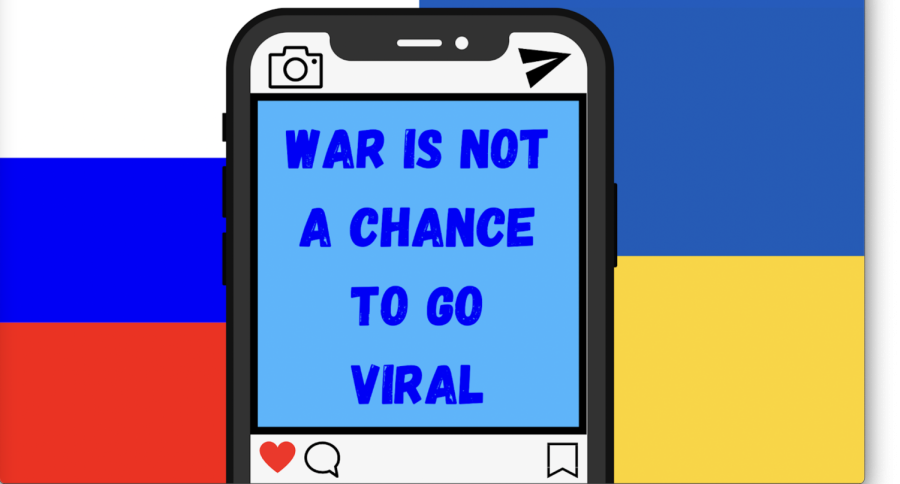Echols: Wartime Memes, jokes reveal privilege among social media users
Through social media platforms, many users have been using the Russo-Ukrainian War to gain likes and follows.
April 20, 2022
Beginning on Feb. 24, Russian President Vladimir Putin launched a full-scale military invasion into Ukraine. The reality Ukrainians once knew has shattered, as they now are fighting for their country, families and lives.
Many Ukrainian soldiers and civilians, including children, have died since the invasion began. These people aren’t simply statistics; they were friends, relatives, coworkers, classmates and loved ones. This reality is one that social media users outside of the violence seem to ignore.
Over the past few years, social media has been a driving force in sharing news, information and opinions regarding social change, especially in the United States. Social media’s role in social issues remains the same in the current global climate. Giants like Twitter, Instagram and TikTok now hold the burden of war once exclusive to printed and radio form. Along with the informative infographics, empathy and support for Ukraine spread through the medium, the duality of humanity is displayed by also providing a platform for insensitive and inappropriate jokes.
The types of posts that usually fill the For You page of TikTok and Explore page of Instagram, full of crude humor and silly gags, do not adapt well to present serious conflicts. Under the guise of coping and dark humor, those physically separate from the horrors in Russia and Ukraine, specifically Americans, who have never had an international conflict fought on American soil, have posted inappropriate and insensitive comments, memes and jokes about the war. These American social media users have yet to understand the immense privilege involved in deciding to tweet a joke about the war in the United States instead of frantically searching for safety amid the chaos of Ukraine. Reveling the “apocalypse vibes” made through the Russian bombing, comparing the war to “Star Wars“ and making many more unnecessary comments minimize the seriousness and pain surrounding the war.
Humor is a common and expected form of human coping, however, and one shouldn’t be immediately scolded for doing so. After all, at the heart of the jokes, they reveal that we are only human and virtually powerless when it comes to situations of this magnitude.
Saleem Alhabash, an associate professor in Michigan State University’s advertising department who studies memes and social media, said memes are a valid response to a crisis and are a reflection of public sentiment.
“These memes, the way that people are communicating, could be a reflection of the general feeling that people are having,” he said. “This uncertainty about what is going to happen and how severe this trend is. So while they might appear humorous or [dismissive] of the seriousness, they can reflect [public] sentiment.”
Nevertheless, delegitimizing the magnitude of pain and bloodshed experienced by Russian and Ukrainian people to make oneself feel more comfortable does more harm than good. It doesn’t change their realities; instead, it only discredits their situation and delays action.
Of course, there is no one right way to respond to war. People are bound to feel unnerved when living through the first European war since World War II, regardless of their proximity to the war. There is nothing wrong with finding outlets to stomach the uncertainty of the situation. Still, there is no excuse to lose human decency when referring to the conflict, including in crass TikTok videos and crude comments on disturbing posts of Ukrainian pain.
It is especially inexcusable for us Americans, safely tucked away in our beds and thousands of miles away from the heart of the violence.
War is not an opportunity to go viral. The potential likes, comments and shares should not outweigh morality, especially when empathy and support are needed in a time like this.









